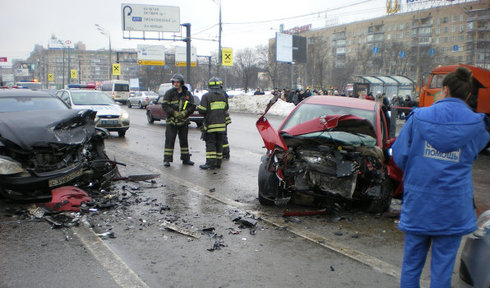With the loss of communist institutions following 1991-92, however, there is another interesting effect that is happening in Russia and the Central Asian post-Soviet republics (and to a lesser extent in Ukraine and Moldova). As institutions seem to be most effective when they are organic, as the result of spontaneous order rather than central planning, the collapse of centrally-constructed institutions left a large institutional vacuum. With foreign aid coming in by the boatload from the US and then later the EU, there was a rush to "build" the institutions that everyone knew were important for a market-economy. Of course, this was also somewhat central planning, as institutional structures were imported, as was legislation and guiding regulations. And also of course, the fact that the aid that was coming in was government-to-government meant that one of the largest institutions, government itself, was unquestionably accepted as necessary. This led to much crowding out of private institutions, private approaches to economic problems, and adoption of many of the private ways that survived communism (albeit at a small scale).
Indeed, this swap of communist institutions for market-oriented ones, being done in a planned manner, meant that the bonds that make an institution function (beyond mere legality) were somewhat glossed over. Only in countries that vitiated the power of the state did informal institutions have a chance of becoming formal, while in the post-Soviet republics, where the power of the state never waned, we have swapped out one set of institutions for another. And this replacement of institutions has created, as Baudrillard might say, a "simulation" of institutions - that is, there are shells of institutions in place, even given legal status or operational with a staff and everything (see: judiciary, competition agencies, etc.) but they don't REALLY exist. That is, again to call on Baudrillard, there was no original here in Russia, so what we have is just the simulation of an institution. And the simulation of an institution doesn't fulfill the same economic role that a real institution would... at least in terms of facilitation. It sure can hinder an economy.
In one sense, Russia has been here before - after all, this is where the Potemkin village was born! A false facade that hides the fact that there is nothing behind it. In some sense, this is where Russia's institutional problems arise from (for more on Russia's institutional development, see my piece here). But in another sense, and what I hinted at before, is the fact that the state never left - there always was an omnipotent government to stand over you (or push you down). The conception of the state went from being the punisher of kulaks and capitalist exploiters to a referee overseeing the market (often with the same people in charge), but the idea of the state was never questioned.
This leads me to the title of my (long) blog post today - Russia is in fact a nation of laws, but not rules. That is, the institutions and their simulations have a very well-developed body of laws, implementing regulations, administrative fiats, etc., covering every situation. In short, the state has tried to think of everything and has a law handy for each situation. However, it is in the cracks that the state doesn't fill that the economy and, indeed, real-life occurs. Thus, Russia has a fantastic set of laws, but there are little informal rules to cover or give guidance. Informal institutions have been almost entirely crowded out by the official simulations.
A great example of this is in handling traffic accidents. When a traffic accident occurs, it often paralyzes the street and creates traffic for miles. This is simply because no one moves their car - even just a minor fender-bender means the cars must be frozen in place until the police arrive. Because, you see, a traffic accident is somehow a criminal act that requires the hand of the state to intervene. Heaven forbid that it can be seen as a private issue between two cars, two drivers, and (possibly) two insurance companies. While one waits for the hands of the state to arrive, nothing can be done, and so drivers literally block three lanes of traffic for hours because, well, there's no guidance on how to settle it otherwise.
Where does this leave us? Well, it appears to me that there is a definite argument to be made that the state's formal institutions crowd out informal ones, with simulations of institutions taking over. More importantly, this crowding out effect means that people are unable to form the guidance that they normally would be able to, and instead remain helpless wards of the state. Which, come to think of it, might be why they are so popular with politicians.
Remember this the next time someone tells you "institutions were neglected" in transition economies - when someone like Stiglitz says that the reason reforms failed was that tax administration wasn't built up fast enough!! - and ponder, how could they have been built differently? As I've tried to show here, it could have been a more rapid diminution of the state and filling the vacuum with informal and private alternatives. But for those who claim that institutions were neglected, this is rarely what they mean.

 RSS Feed
RSS Feed
